Analysis of Global Management in Singapore's Hospitality Sector
VerifiedAdded on 2020/07/22
|9
|3600
|40
Report
AI Summary
This report provides an analysis of the cross-cultural and global management practices within Singapore's hospitality industry. It begins with an introduction discussing the economic recovery after the 2008 financial crisis and its positive impact on the tourism sector, specifically highlighting Singapore's potential as a tourism destination. The main body explores the influence of globalization and internationalization, including the impact on visa policies, international trade, service offshoring, and the emergence of a global culture. It also discusses the importance of cultural diversity and its role in attracting tourists, as well as the advancements in technology, such as the use of robots in the hotel industry. The report further examines the concept of internationalization and includes an analysis using Hofstede's cultural dimensions, focusing on power distance and individualism vs. collectivism. Finally, it includes a PESTLE analysis of the hospitality industry in Singapore, although the provided text is incomplete. The report concludes by emphasizing the opportunities for hotel investment in Singapore due to its favorable conditions and internationalization.
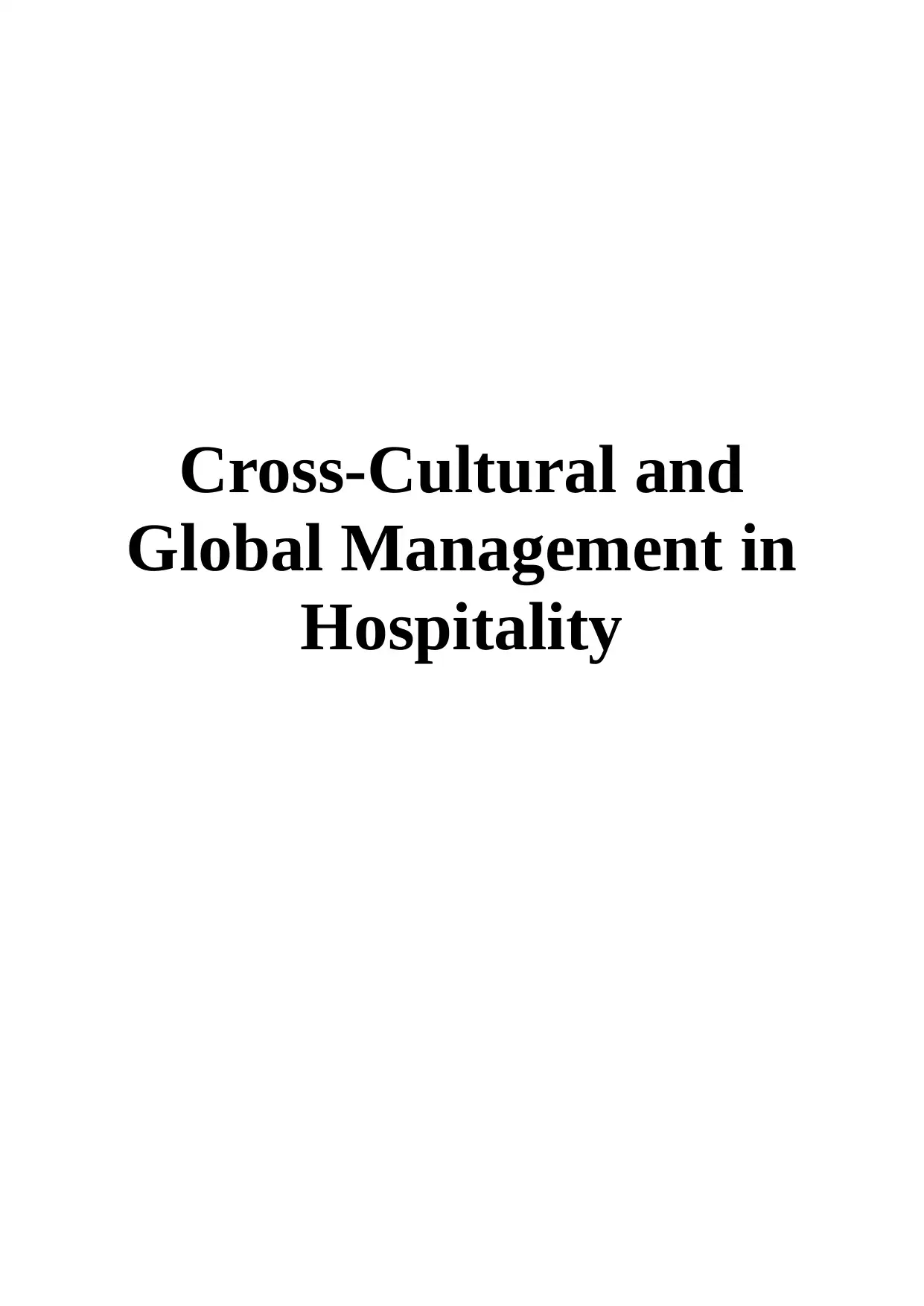
Cross-Cultural and
Global Management in
Hospitality
Global Management in
Hospitality
Paraphrase This Document
Need a fresh take? Get an instant paraphrase of this document with our AI Paraphraser

TABLE OF CONTENTS
INTRODUCTION................................................................................................................................3
MAIN BODY.......................................................................................................................................3
CONCLUSION....................................................................................................................................8
REFERENCES.....................................................................................................................................9
INTRODUCTION................................................................................................................................3
MAIN BODY.......................................................................................................................................3
CONCLUSION....................................................................................................................................8
REFERENCES.....................................................................................................................................9
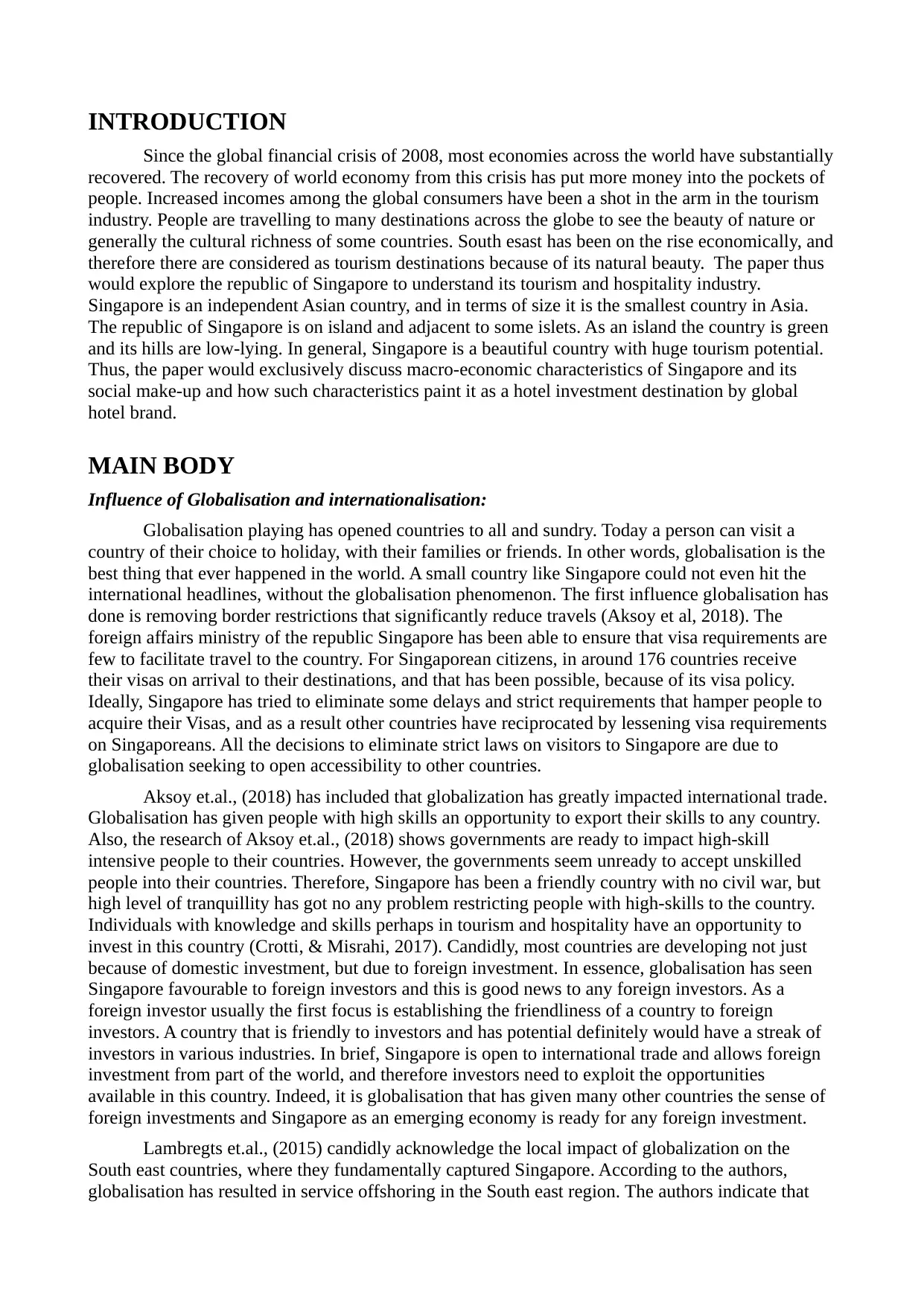
INTRODUCTION
Since the global financial crisis of 2008, most economies across the world have substantially
recovered. The recovery of world economy from this crisis has put more money into the pockets of
people. Increased incomes among the global consumers have been a shot in the arm in the tourism
industry. People are travelling to many destinations across the globe to see the beauty of nature or
generally the cultural richness of some countries. South esast has been on the rise economically, and
therefore there are considered as tourism destinations because of its natural beauty. The paper thus
would explore the republic of Singapore to understand its tourism and hospitality industry.
Singapore is an independent Asian country, and in terms of size it is the smallest country in Asia.
The republic of Singapore is on island and adjacent to some islets. As an island the country is green
and its hills are low-lying. In general, Singapore is a beautiful country with huge tourism potential.
Thus, the paper would exclusively discuss macro-economic characteristics of Singapore and its
social make-up and how such characteristics paint it as a hotel investment destination by global
hotel brand.
MAIN BODY
Influence of Globalisation and internationalisation:
Globalisation playing has opened countries to all and sundry. Today a person can visit a
country of their choice to holiday, with their families or friends. In other words, globalisation is the
best thing that ever happened in the world. A small country like Singapore could not even hit the
international headlines, without the globalisation phenomenon. The first influence globalisation has
done is removing border restrictions that significantly reduce travels (Aksoy et al, 2018). The
foreign affairs ministry of the republic Singapore has been able to ensure that visa requirements are
few to facilitate travel to the country. For Singaporean citizens, in around 176 countries receive
their visas on arrival to their destinations, and that has been possible, because of its visa policy.
Ideally, Singapore has tried to eliminate some delays and strict requirements that hamper people to
acquire their Visas, and as a result other countries have reciprocated by lessening visa requirements
on Singaporeans. All the decisions to eliminate strict laws on visitors to Singapore are due to
globalisation seeking to open accessibility to other countries.
Aksoy et.al., (2018) has included that globalization has greatly impacted international trade.
Globalisation has given people with high skills an opportunity to export their skills to any country.
Also, the research of Aksoy et.al., (2018) shows governments are ready to impact high-skill
intensive people to their countries. However, the governments seem unready to accept unskilled
people into their countries. Therefore, Singapore has been a friendly country with no civil war, but
high level of tranquillity has got no any problem restricting people with high-skills to the country.
Individuals with knowledge and skills perhaps in tourism and hospitality have an opportunity to
invest in this country (Crotti, & Misrahi, 2017). Candidly, most countries are developing not just
because of domestic investment, but due to foreign investment. In essence, globalisation has seen
Singapore favourable to foreign investors and this is good news to any foreign investors. As a
foreign investor usually the first focus is establishing the friendliness of a country to foreign
investors. A country that is friendly to investors and has potential definitely would have a streak of
investors in various industries. In brief, Singapore is open to international trade and allows foreign
investment from part of the world, and therefore investors need to exploit the opportunities
available in this country. Indeed, it is globalisation that has given many other countries the sense of
foreign investments and Singapore as an emerging economy is ready for any foreign investment.
Lambregts et.al., (2015) candidly acknowledge the local impact of globalization on the
South east countries, where they fundamentally captured Singapore. According to the authors,
globalisation has resulted in service offshoring in the South east region. The authors indicate that
Since the global financial crisis of 2008, most economies across the world have substantially
recovered. The recovery of world economy from this crisis has put more money into the pockets of
people. Increased incomes among the global consumers have been a shot in the arm in the tourism
industry. People are travelling to many destinations across the globe to see the beauty of nature or
generally the cultural richness of some countries. South esast has been on the rise economically, and
therefore there are considered as tourism destinations because of its natural beauty. The paper thus
would explore the republic of Singapore to understand its tourism and hospitality industry.
Singapore is an independent Asian country, and in terms of size it is the smallest country in Asia.
The republic of Singapore is on island and adjacent to some islets. As an island the country is green
and its hills are low-lying. In general, Singapore is a beautiful country with huge tourism potential.
Thus, the paper would exclusively discuss macro-economic characteristics of Singapore and its
social make-up and how such characteristics paint it as a hotel investment destination by global
hotel brand.
MAIN BODY
Influence of Globalisation and internationalisation:
Globalisation playing has opened countries to all and sundry. Today a person can visit a
country of their choice to holiday, with their families or friends. In other words, globalisation is the
best thing that ever happened in the world. A small country like Singapore could not even hit the
international headlines, without the globalisation phenomenon. The first influence globalisation has
done is removing border restrictions that significantly reduce travels (Aksoy et al, 2018). The
foreign affairs ministry of the republic Singapore has been able to ensure that visa requirements are
few to facilitate travel to the country. For Singaporean citizens, in around 176 countries receive
their visas on arrival to their destinations, and that has been possible, because of its visa policy.
Ideally, Singapore has tried to eliminate some delays and strict requirements that hamper people to
acquire their Visas, and as a result other countries have reciprocated by lessening visa requirements
on Singaporeans. All the decisions to eliminate strict laws on visitors to Singapore are due to
globalisation seeking to open accessibility to other countries.
Aksoy et.al., (2018) has included that globalization has greatly impacted international trade.
Globalisation has given people with high skills an opportunity to export their skills to any country.
Also, the research of Aksoy et.al., (2018) shows governments are ready to impact high-skill
intensive people to their countries. However, the governments seem unready to accept unskilled
people into their countries. Therefore, Singapore has been a friendly country with no civil war, but
high level of tranquillity has got no any problem restricting people with high-skills to the country.
Individuals with knowledge and skills perhaps in tourism and hospitality have an opportunity to
invest in this country (Crotti, & Misrahi, 2017). Candidly, most countries are developing not just
because of domestic investment, but due to foreign investment. In essence, globalisation has seen
Singapore favourable to foreign investors and this is good news to any foreign investors. As a
foreign investor usually the first focus is establishing the friendliness of a country to foreign
investors. A country that is friendly to investors and has potential definitely would have a streak of
investors in various industries. In brief, Singapore is open to international trade and allows foreign
investment from part of the world, and therefore investors need to exploit the opportunities
available in this country. Indeed, it is globalisation that has given many other countries the sense of
foreign investments and Singapore as an emerging economy is ready for any foreign investment.
Lambregts et.al., (2015) candidly acknowledge the local impact of globalization on the
South east countries, where they fundamentally captured Singapore. According to the authors,
globalisation has resulted in service offshoring in the South east region. The authors indicate that
⊘ This is a preview!⊘
Do you want full access?
Subscribe today to unlock all pages.

Trusted by 1+ million students worldwide
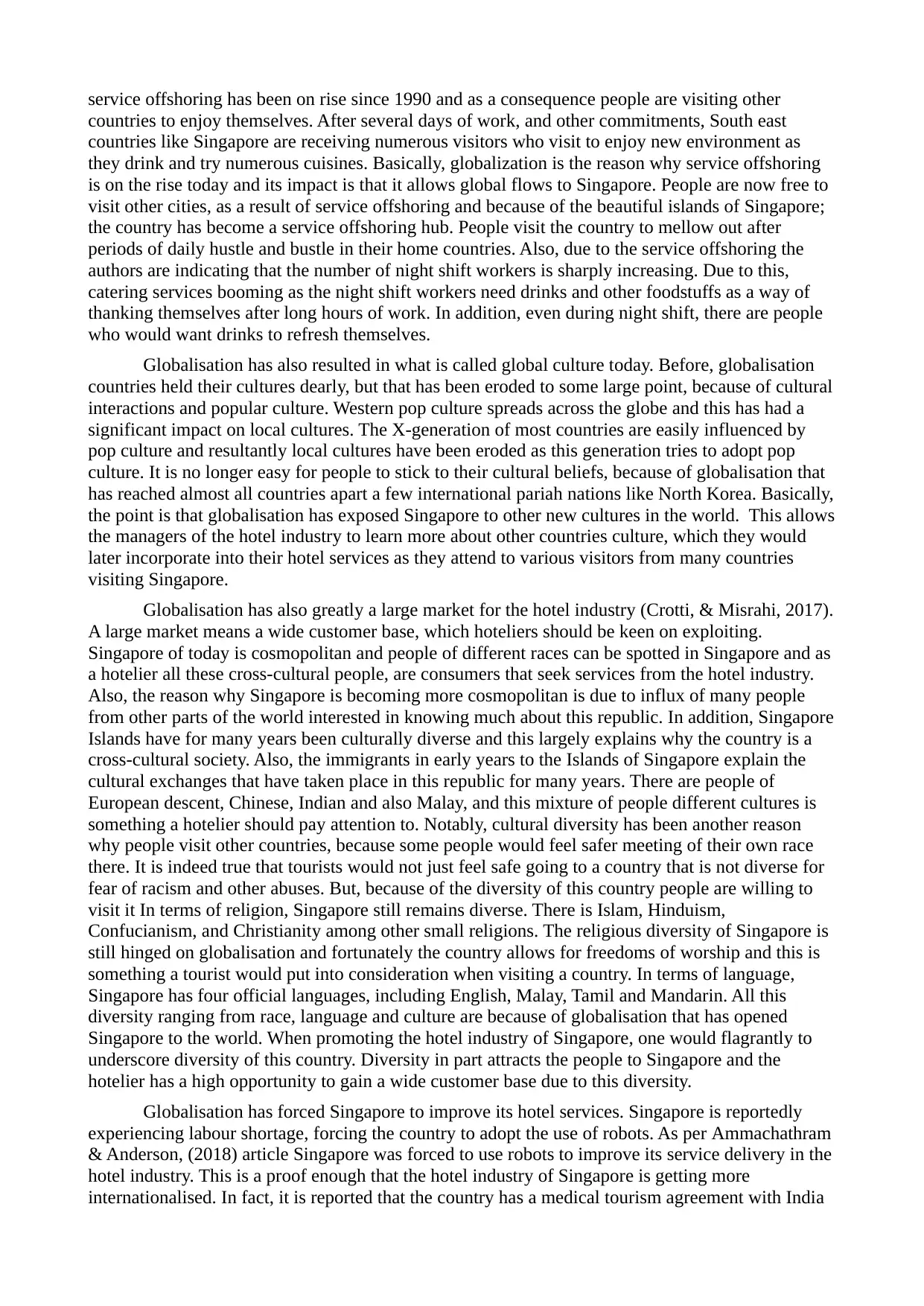
service offshoring has been on rise since 1990 and as a consequence people are visiting other
countries to enjoy themselves. After several days of work, and other commitments, South east
countries like Singapore are receiving numerous visitors who visit to enjoy new environment as
they drink and try numerous cuisines. Basically, globalization is the reason why service offshoring
is on the rise today and its impact is that it allows global flows to Singapore. People are now free to
visit other cities, as a result of service offshoring and because of the beautiful islands of Singapore;
the country has become a service offshoring hub. People visit the country to mellow out after
periods of daily hustle and bustle in their home countries. Also, due to the service offshoring the
authors are indicating that the number of night shift workers is sharply increasing. Due to this,
catering services booming as the night shift workers need drinks and other foodstuffs as a way of
thanking themselves after long hours of work. In addition, even during night shift, there are people
who would want drinks to refresh themselves.
Globalisation has also resulted in what is called global culture today. Before, globalisation
countries held their cultures dearly, but that has been eroded to some large point, because of cultural
interactions and popular culture. Western pop culture spreads across the globe and this has had a
significant impact on local cultures. The X-generation of most countries are easily influenced by
pop culture and resultantly local cultures have been eroded as this generation tries to adopt pop
culture. It is no longer easy for people to stick to their cultural beliefs, because of globalisation that
has reached almost all countries apart a few international pariah nations like North Korea. Basically,
the point is that globalisation has exposed Singapore to other new cultures in the world. This allows
the managers of the hotel industry to learn more about other countries culture, which they would
later incorporate into their hotel services as they attend to various visitors from many countries
visiting Singapore.
Globalisation has also greatly a large market for the hotel industry (Crotti, & Misrahi, 2017).
A large market means a wide customer base, which hoteliers should be keen on exploiting.
Singapore of today is cosmopolitan and people of different races can be spotted in Singapore and as
a hotelier all these cross-cultural people, are consumers that seek services from the hotel industry.
Also, the reason why Singapore is becoming more cosmopolitan is due to influx of many people
from other parts of the world interested in knowing much about this republic. In addition, Singapore
Islands have for many years been culturally diverse and this largely explains why the country is a
cross-cultural society. Also, the immigrants in early years to the Islands of Singapore explain the
cultural exchanges that have taken place in this republic for many years. There are people of
European descent, Chinese, Indian and also Malay, and this mixture of people different cultures is
something a hotelier should pay attention to. Notably, cultural diversity has been another reason
why people visit other countries, because some people would feel safer meeting of their own race
there. It is indeed true that tourists would not just feel safe going to a country that is not diverse for
fear of racism and other abuses. But, because of the diversity of this country people are willing to
visit it In terms of religion, Singapore still remains diverse. There is Islam, Hinduism,
Confucianism, and Christianity among other small religions. The religious diversity of Singapore is
still hinged on globalisation and fortunately the country allows for freedoms of worship and this is
something a tourist would put into consideration when visiting a country. In terms of language,
Singapore has four official languages, including English, Malay, Tamil and Mandarin. All this
diversity ranging from race, language and culture are because of globalisation that has opened
Singapore to the world. When promoting the hotel industry of Singapore, one would flagrantly to
underscore diversity of this country. Diversity in part attracts the people to Singapore and the
hotelier has a high opportunity to gain a wide customer base due to this diversity.
Globalisation has forced Singapore to improve its hotel services. Singapore is reportedly
experiencing labour shortage, forcing the country to adopt the use of robots. As per Ammachathram
& Anderson, (2018) article Singapore was forced to use robots to improve its service delivery in the
hotel industry. This is a proof enough that the hotel industry of Singapore is getting more
internationalised. In fact, it is reported that the country has a medical tourism agreement with India
countries to enjoy themselves. After several days of work, and other commitments, South east
countries like Singapore are receiving numerous visitors who visit to enjoy new environment as
they drink and try numerous cuisines. Basically, globalization is the reason why service offshoring
is on the rise today and its impact is that it allows global flows to Singapore. People are now free to
visit other cities, as a result of service offshoring and because of the beautiful islands of Singapore;
the country has become a service offshoring hub. People visit the country to mellow out after
periods of daily hustle and bustle in their home countries. Also, due to the service offshoring the
authors are indicating that the number of night shift workers is sharply increasing. Due to this,
catering services booming as the night shift workers need drinks and other foodstuffs as a way of
thanking themselves after long hours of work. In addition, even during night shift, there are people
who would want drinks to refresh themselves.
Globalisation has also resulted in what is called global culture today. Before, globalisation
countries held their cultures dearly, but that has been eroded to some large point, because of cultural
interactions and popular culture. Western pop culture spreads across the globe and this has had a
significant impact on local cultures. The X-generation of most countries are easily influenced by
pop culture and resultantly local cultures have been eroded as this generation tries to adopt pop
culture. It is no longer easy for people to stick to their cultural beliefs, because of globalisation that
has reached almost all countries apart a few international pariah nations like North Korea. Basically,
the point is that globalisation has exposed Singapore to other new cultures in the world. This allows
the managers of the hotel industry to learn more about other countries culture, which they would
later incorporate into their hotel services as they attend to various visitors from many countries
visiting Singapore.
Globalisation has also greatly a large market for the hotel industry (Crotti, & Misrahi, 2017).
A large market means a wide customer base, which hoteliers should be keen on exploiting.
Singapore of today is cosmopolitan and people of different races can be spotted in Singapore and as
a hotelier all these cross-cultural people, are consumers that seek services from the hotel industry.
Also, the reason why Singapore is becoming more cosmopolitan is due to influx of many people
from other parts of the world interested in knowing much about this republic. In addition, Singapore
Islands have for many years been culturally diverse and this largely explains why the country is a
cross-cultural society. Also, the immigrants in early years to the Islands of Singapore explain the
cultural exchanges that have taken place in this republic for many years. There are people of
European descent, Chinese, Indian and also Malay, and this mixture of people different cultures is
something a hotelier should pay attention to. Notably, cultural diversity has been another reason
why people visit other countries, because some people would feel safer meeting of their own race
there. It is indeed true that tourists would not just feel safe going to a country that is not diverse for
fear of racism and other abuses. But, because of the diversity of this country people are willing to
visit it In terms of religion, Singapore still remains diverse. There is Islam, Hinduism,
Confucianism, and Christianity among other small religions. The religious diversity of Singapore is
still hinged on globalisation and fortunately the country allows for freedoms of worship and this is
something a tourist would put into consideration when visiting a country. In terms of language,
Singapore has four official languages, including English, Malay, Tamil and Mandarin. All this
diversity ranging from race, language and culture are because of globalisation that has opened
Singapore to the world. When promoting the hotel industry of Singapore, one would flagrantly to
underscore diversity of this country. Diversity in part attracts the people to Singapore and the
hotelier has a high opportunity to gain a wide customer base due to this diversity.
Globalisation has forced Singapore to improve its hotel services. Singapore is reportedly
experiencing labour shortage, forcing the country to adopt the use of robots. As per Ammachathram
& Anderson, (2018) article Singapore was forced to use robots to improve its service delivery in the
hotel industry. This is a proof enough that the hotel industry of Singapore is getting more
internationalised. In fact, it is reported that the country has a medical tourism agreement with India
Paraphrase This Document
Need a fresh take? Get an instant paraphrase of this document with our AI Paraphraser
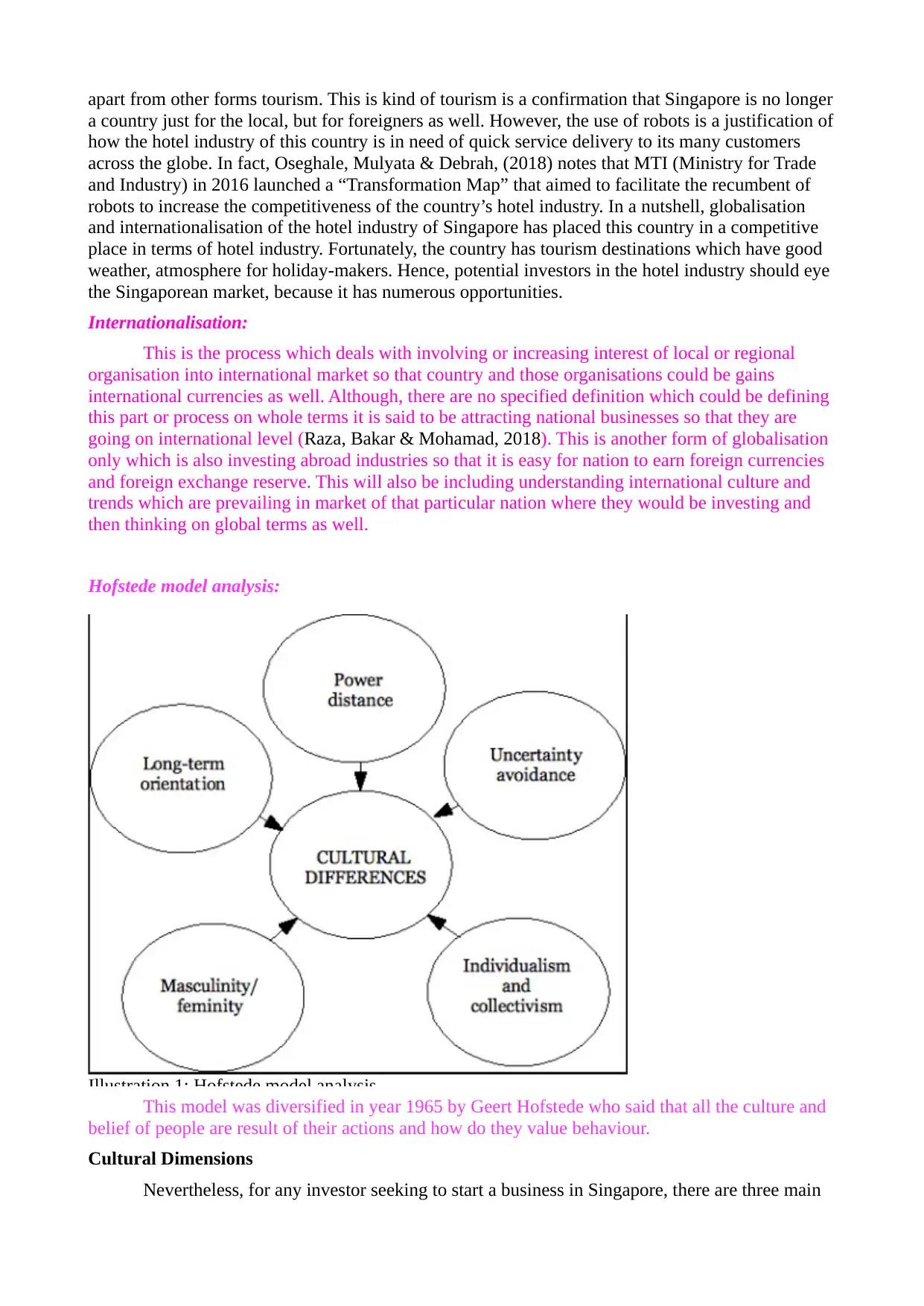
apart from other forms tourism. This is kind of tourism is a confirmation that Singapore is no longer
a country just for the local, but for foreigners as well. However, the use of robots is a justification of
how the hotel industry of this country is in need of quick service delivery to its many customers
across the globe. In fact, Oseghale, Mulyata & Debrah, (2018) notes that MTI (Ministry for Trade
and Industry) in 2016 launched a “Transformation Map” that aimed to facilitate the recumbent of
robots to increase the competitiveness of the country’s hotel industry. In a nutshell, globalisation
and internationalisation of the hotel industry of Singapore has placed this country in a competitive
place in terms of hotel industry. Fortunately, the country has tourism destinations which have good
weather, atmosphere for holiday-makers. Hence, potential investors in the hotel industry should eye
the Singaporean market, because it has numerous opportunities.
Internationalisation:
This is the process which deals with involving or increasing interest of local or regional
organisation into international market so that country and those organisations could be gains
international currencies as well. Although, there are no specified definition which could be defining
this part or process on whole terms it is said to be attracting national businesses so that they are
going on international level (Raza, Bakar & Mohamad, 2018). This is another form of globalisation
only which is also investing abroad industries so that it is easy for nation to earn foreign currencies
and foreign exchange reserve. This will also be including understanding international culture and
trends which are prevailing in market of that particular nation where they would be investing and
then thinking on global terms as well.
Hofstede model analysis:
Illustration 1: Hofstede model analysis
This model was diversified in year 1965 by Geert Hofstede who said that all the culture and
belief of people are result of their actions and how do they value behaviour.
Cultural Dimensions
Nevertheless, for any investor seeking to start a business in Singapore, there are three main
a country just for the local, but for foreigners as well. However, the use of robots is a justification of
how the hotel industry of this country is in need of quick service delivery to its many customers
across the globe. In fact, Oseghale, Mulyata & Debrah, (2018) notes that MTI (Ministry for Trade
and Industry) in 2016 launched a “Transformation Map” that aimed to facilitate the recumbent of
robots to increase the competitiveness of the country’s hotel industry. In a nutshell, globalisation
and internationalisation of the hotel industry of Singapore has placed this country in a competitive
place in terms of hotel industry. Fortunately, the country has tourism destinations which have good
weather, atmosphere for holiday-makers. Hence, potential investors in the hotel industry should eye
the Singaporean market, because it has numerous opportunities.
Internationalisation:
This is the process which deals with involving or increasing interest of local or regional
organisation into international market so that country and those organisations could be gains
international currencies as well. Although, there are no specified definition which could be defining
this part or process on whole terms it is said to be attracting national businesses so that they are
going on international level (Raza, Bakar & Mohamad, 2018). This is another form of globalisation
only which is also investing abroad industries so that it is easy for nation to earn foreign currencies
and foreign exchange reserve. This will also be including understanding international culture and
trends which are prevailing in market of that particular nation where they would be investing and
then thinking on global terms as well.
Hofstede model analysis:
Illustration 1: Hofstede model analysis
This model was diversified in year 1965 by Geert Hofstede who said that all the culture and
belief of people are result of their actions and how do they value behaviour.
Cultural Dimensions
Nevertheless, for any investor seeking to start a business in Singapore, there are three main
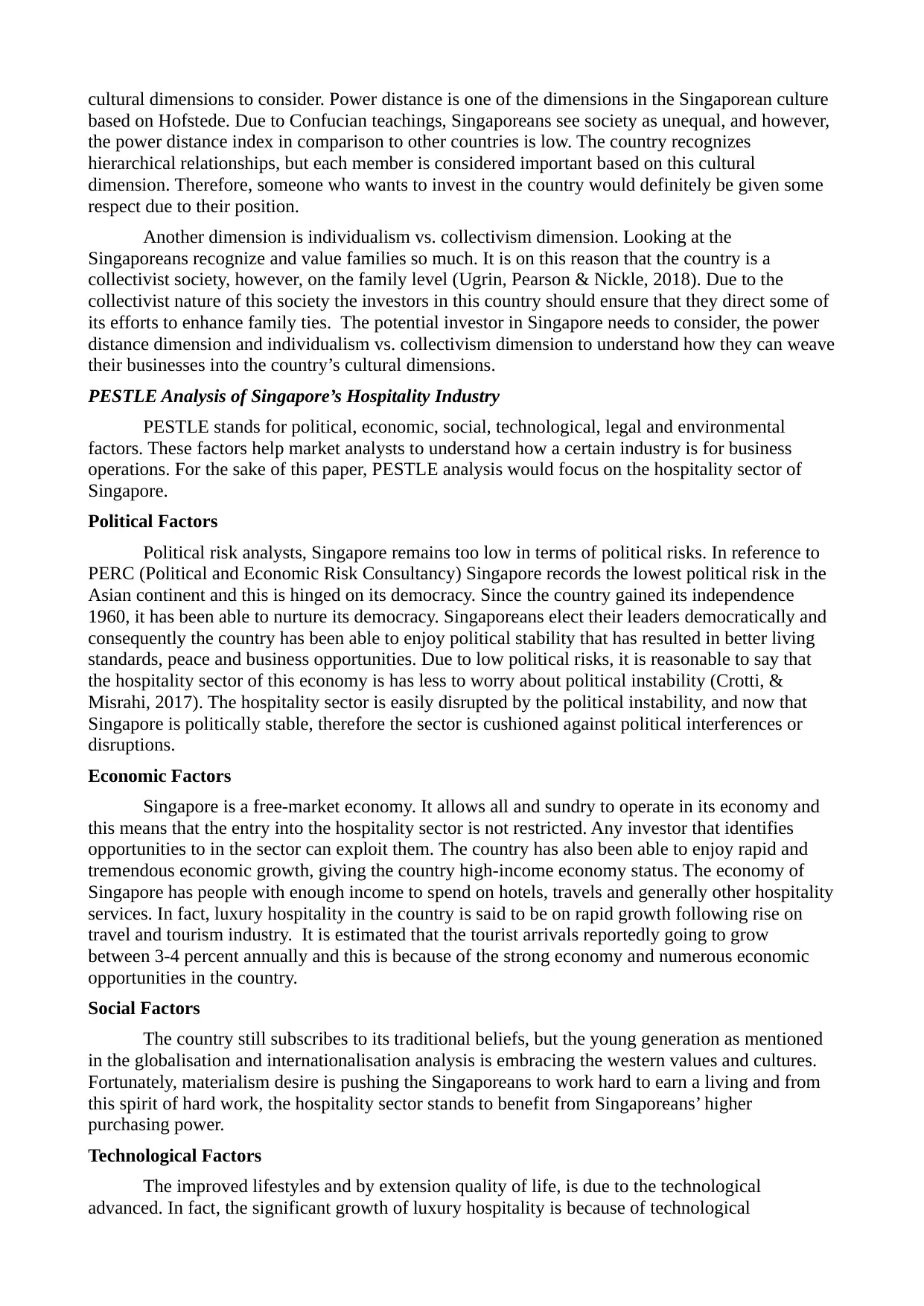
cultural dimensions to consider. Power distance is one of the dimensions in the Singaporean culture
based on Hofstede. Due to Confucian teachings, Singaporeans see society as unequal, and however,
the power distance index in comparison to other countries is low. The country recognizes
hierarchical relationships, but each member is considered important based on this cultural
dimension. Therefore, someone who wants to invest in the country would definitely be given some
respect due to their position.
Another dimension is individualism vs. collectivism dimension. Looking at the
Singaporeans recognize and value families so much. It is on this reason that the country is a
collectivist society, however, on the family level (Ugrin, Pearson & Nickle, 2018). Due to the
collectivist nature of this society the investors in this country should ensure that they direct some of
its efforts to enhance family ties. The potential investor in Singapore needs to consider, the power
distance dimension and individualism vs. collectivism dimension to understand how they can weave
their businesses into the country’s cultural dimensions.
PESTLE Analysis of Singapore’s Hospitality Industry
PESTLE stands for political, economic, social, technological, legal and environmental
factors. These factors help market analysts to understand how a certain industry is for business
operations. For the sake of this paper, PESTLE analysis would focus on the hospitality sector of
Singapore.
Political Factors
Political risk analysts, Singapore remains too low in terms of political risks. In reference to
PERC (Political and Economic Risk Consultancy) Singapore records the lowest political risk in the
Asian continent and this is hinged on its democracy. Since the country gained its independence
1960, it has been able to nurture its democracy. Singaporeans elect their leaders democratically and
consequently the country has been able to enjoy political stability that has resulted in better living
standards, peace and business opportunities. Due to low political risks, it is reasonable to say that
the hospitality sector of this economy is has less to worry about political instability (Crotti, &
Misrahi, 2017). The hospitality sector is easily disrupted by the political instability, and now that
Singapore is politically stable, therefore the sector is cushioned against political interferences or
disruptions.
Economic Factors
Singapore is a free-market economy. It allows all and sundry to operate in its economy and
this means that the entry into the hospitality sector is not restricted. Any investor that identifies
opportunities to in the sector can exploit them. The country has also been able to enjoy rapid and
tremendous economic growth, giving the country high-income economy status. The economy of
Singapore has people with enough income to spend on hotels, travels and generally other hospitality
services. In fact, luxury hospitality in the country is said to be on rapid growth following rise on
travel and tourism industry. It is estimated that the tourist arrivals reportedly going to grow
between 3-4 percent annually and this is because of the strong economy and numerous economic
opportunities in the country.
Social Factors
The country still subscribes to its traditional beliefs, but the young generation as mentioned
in the globalisation and internationalisation analysis is embracing the western values and cultures.
Fortunately, materialism desire is pushing the Singaporeans to work hard to earn a living and from
this spirit of hard work, the hospitality sector stands to benefit from Singaporeans’ higher
purchasing power.
Technological Factors
The improved lifestyles and by extension quality of life, is due to the technological
advanced. In fact, the significant growth of luxury hospitality is because of technological
based on Hofstede. Due to Confucian teachings, Singaporeans see society as unequal, and however,
the power distance index in comparison to other countries is low. The country recognizes
hierarchical relationships, but each member is considered important based on this cultural
dimension. Therefore, someone who wants to invest in the country would definitely be given some
respect due to their position.
Another dimension is individualism vs. collectivism dimension. Looking at the
Singaporeans recognize and value families so much. It is on this reason that the country is a
collectivist society, however, on the family level (Ugrin, Pearson & Nickle, 2018). Due to the
collectivist nature of this society the investors in this country should ensure that they direct some of
its efforts to enhance family ties. The potential investor in Singapore needs to consider, the power
distance dimension and individualism vs. collectivism dimension to understand how they can weave
their businesses into the country’s cultural dimensions.
PESTLE Analysis of Singapore’s Hospitality Industry
PESTLE stands for political, economic, social, technological, legal and environmental
factors. These factors help market analysts to understand how a certain industry is for business
operations. For the sake of this paper, PESTLE analysis would focus on the hospitality sector of
Singapore.
Political Factors
Political risk analysts, Singapore remains too low in terms of political risks. In reference to
PERC (Political and Economic Risk Consultancy) Singapore records the lowest political risk in the
Asian continent and this is hinged on its democracy. Since the country gained its independence
1960, it has been able to nurture its democracy. Singaporeans elect their leaders democratically and
consequently the country has been able to enjoy political stability that has resulted in better living
standards, peace and business opportunities. Due to low political risks, it is reasonable to say that
the hospitality sector of this economy is has less to worry about political instability (Crotti, &
Misrahi, 2017). The hospitality sector is easily disrupted by the political instability, and now that
Singapore is politically stable, therefore the sector is cushioned against political interferences or
disruptions.
Economic Factors
Singapore is a free-market economy. It allows all and sundry to operate in its economy and
this means that the entry into the hospitality sector is not restricted. Any investor that identifies
opportunities to in the sector can exploit them. The country has also been able to enjoy rapid and
tremendous economic growth, giving the country high-income economy status. The economy of
Singapore has people with enough income to spend on hotels, travels and generally other hospitality
services. In fact, luxury hospitality in the country is said to be on rapid growth following rise on
travel and tourism industry. It is estimated that the tourist arrivals reportedly going to grow
between 3-4 percent annually and this is because of the strong economy and numerous economic
opportunities in the country.
Social Factors
The country still subscribes to its traditional beliefs, but the young generation as mentioned
in the globalisation and internationalisation analysis is embracing the western values and cultures.
Fortunately, materialism desire is pushing the Singaporeans to work hard to earn a living and from
this spirit of hard work, the hospitality sector stands to benefit from Singaporeans’ higher
purchasing power.
Technological Factors
The improved lifestyles and by extension quality of life, is due to the technological
advanced. In fact, the significant growth of luxury hospitality is because of technological
⊘ This is a preview!⊘
Do you want full access?
Subscribe today to unlock all pages.

Trusted by 1+ million students worldwide
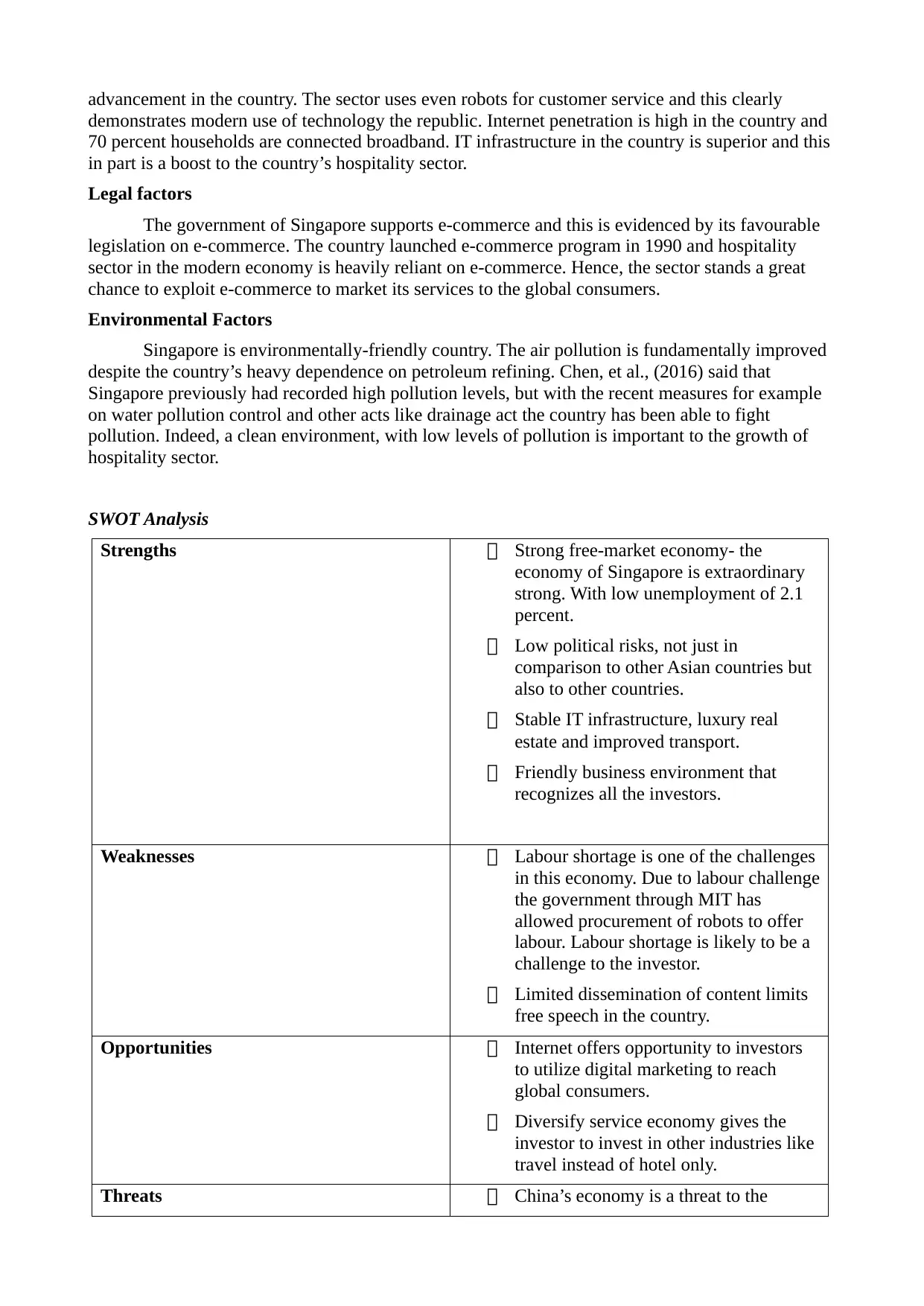
advancement in the country. The sector uses even robots for customer service and this clearly
demonstrates modern use of technology the republic. Internet penetration is high in the country and
70 percent households are connected broadband. IT infrastructure in the country is superior and this
in part is a boost to the country’s hospitality sector.
Legal factors
The government of Singapore supports e-commerce and this is evidenced by its favourable
legislation on e-commerce. The country launched e-commerce program in 1990 and hospitality
sector in the modern economy is heavily reliant on e-commerce. Hence, the sector stands a great
chance to exploit e-commerce to market its services to the global consumers.
Environmental Factors
Singapore is environmentally-friendly country. The air pollution is fundamentally improved
despite the country’s heavy dependence on petroleum refining. Chen, et al., (2016) said that
Singapore previously had recorded high pollution levels, but with the recent measures for example
on water pollution control and other acts like drainage act the country has been able to fight
pollution. Indeed, a clean environment, with low levels of pollution is important to the growth of
hospitality sector.
SWOT Analysis
Strengths Strong free-market economy- the
economy of Singapore is extraordinary
strong. With low unemployment of 2.1
percent.
Low political risks, not just in
comparison to other Asian countries but
also to other countries.
Stable IT infrastructure, luxury real
estate and improved transport.
Friendly business environment that
recognizes all the investors.
Weaknesses Labour shortage is one of the challenges
in this economy. Due to labour challenge
the government through MIT has
allowed procurement of robots to offer
labour. Labour shortage is likely to be a
challenge to the investor.
Limited dissemination of content limits
free speech in the country.
Opportunities Internet offers opportunity to investors
to utilize digital marketing to reach
global consumers.
Diversify service economy gives the
investor to invest in other industries like
travel instead of hotel only.
Threats China’s economy is a threat to the
demonstrates modern use of technology the republic. Internet penetration is high in the country and
70 percent households are connected broadband. IT infrastructure in the country is superior and this
in part is a boost to the country’s hospitality sector.
Legal factors
The government of Singapore supports e-commerce and this is evidenced by its favourable
legislation on e-commerce. The country launched e-commerce program in 1990 and hospitality
sector in the modern economy is heavily reliant on e-commerce. Hence, the sector stands a great
chance to exploit e-commerce to market its services to the global consumers.
Environmental Factors
Singapore is environmentally-friendly country. The air pollution is fundamentally improved
despite the country’s heavy dependence on petroleum refining. Chen, et al., (2016) said that
Singapore previously had recorded high pollution levels, but with the recent measures for example
on water pollution control and other acts like drainage act the country has been able to fight
pollution. Indeed, a clean environment, with low levels of pollution is important to the growth of
hospitality sector.
SWOT Analysis
Strengths Strong free-market economy- the
economy of Singapore is extraordinary
strong. With low unemployment of 2.1
percent.
Low political risks, not just in
comparison to other Asian countries but
also to other countries.
Stable IT infrastructure, luxury real
estate and improved transport.
Friendly business environment that
recognizes all the investors.
Weaknesses Labour shortage is one of the challenges
in this economy. Due to labour challenge
the government through MIT has
allowed procurement of robots to offer
labour. Labour shortage is likely to be a
challenge to the investor.
Limited dissemination of content limits
free speech in the country.
Opportunities Internet offers opportunity to investors
to utilize digital marketing to reach
global consumers.
Diversify service economy gives the
investor to invest in other industries like
travel instead of hotel only.
Threats China’s economy is a threat to the
Paraphrase This Document
Need a fresh take? Get an instant paraphrase of this document with our AI Paraphraser
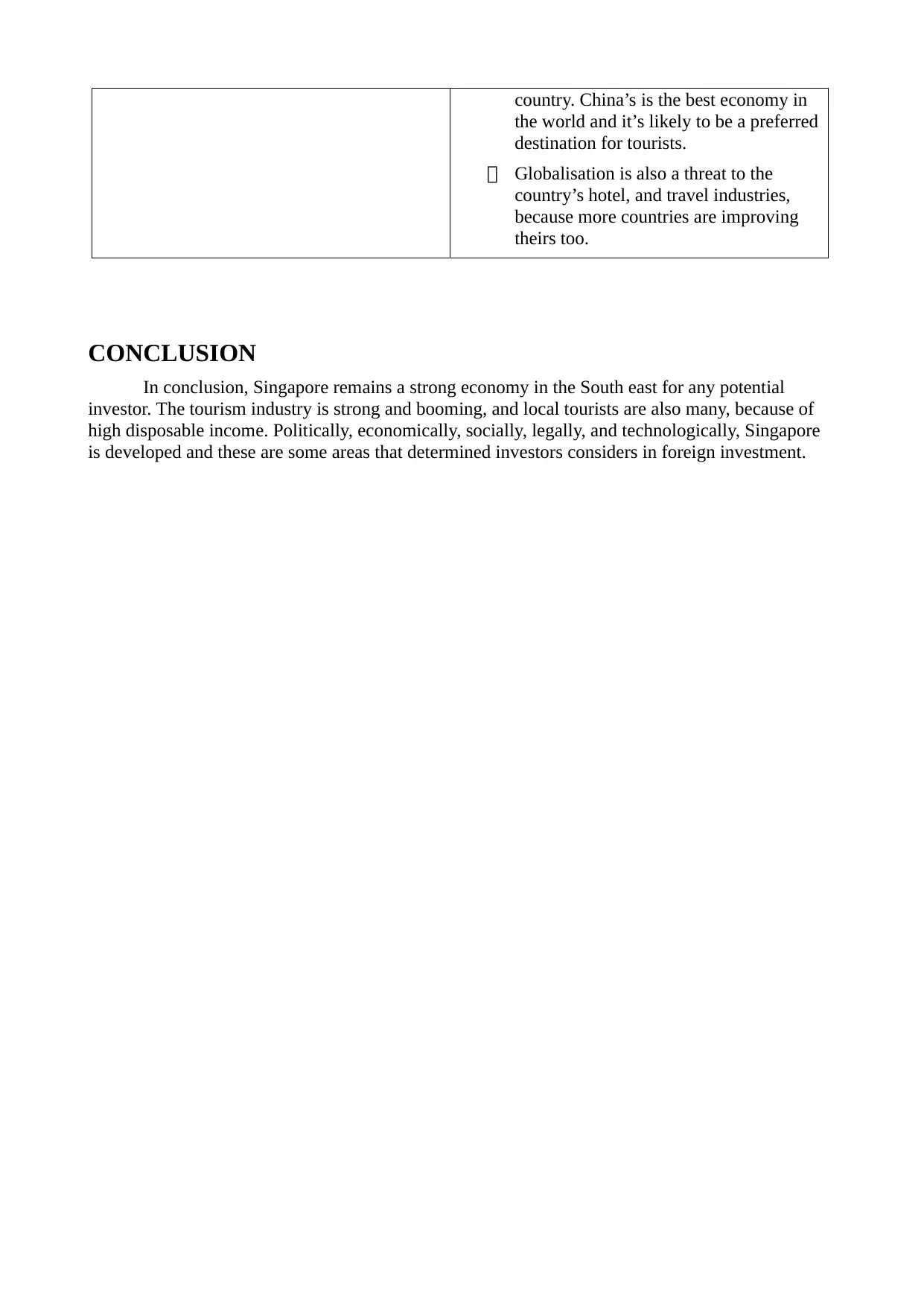
country. China’s is the best economy in
the world and it’s likely to be a preferred
destination for tourists.
Globalisation is also a threat to the
country’s hotel, and travel industries,
because more countries are improving
theirs too.
CONCLUSION
In conclusion, Singapore remains a strong economy in the South east for any potential
investor. The tourism industry is strong and booming, and local tourists are also many, because of
high disposable income. Politically, economically, socially, legally, and technologically, Singapore
is developed and these are some areas that determined investors considers in foreign investment.
the world and it’s likely to be a preferred
destination for tourists.
Globalisation is also a threat to the
country’s hotel, and travel industries,
because more countries are improving
theirs too.
CONCLUSION
In conclusion, Singapore remains a strong economy in the South east for any potential
investor. The tourism industry is strong and booming, and local tourists are also many, because of
high disposable income. Politically, economically, socially, legally, and technologically, Singapore
is developed and these are some areas that determined investors considers in foreign investment.
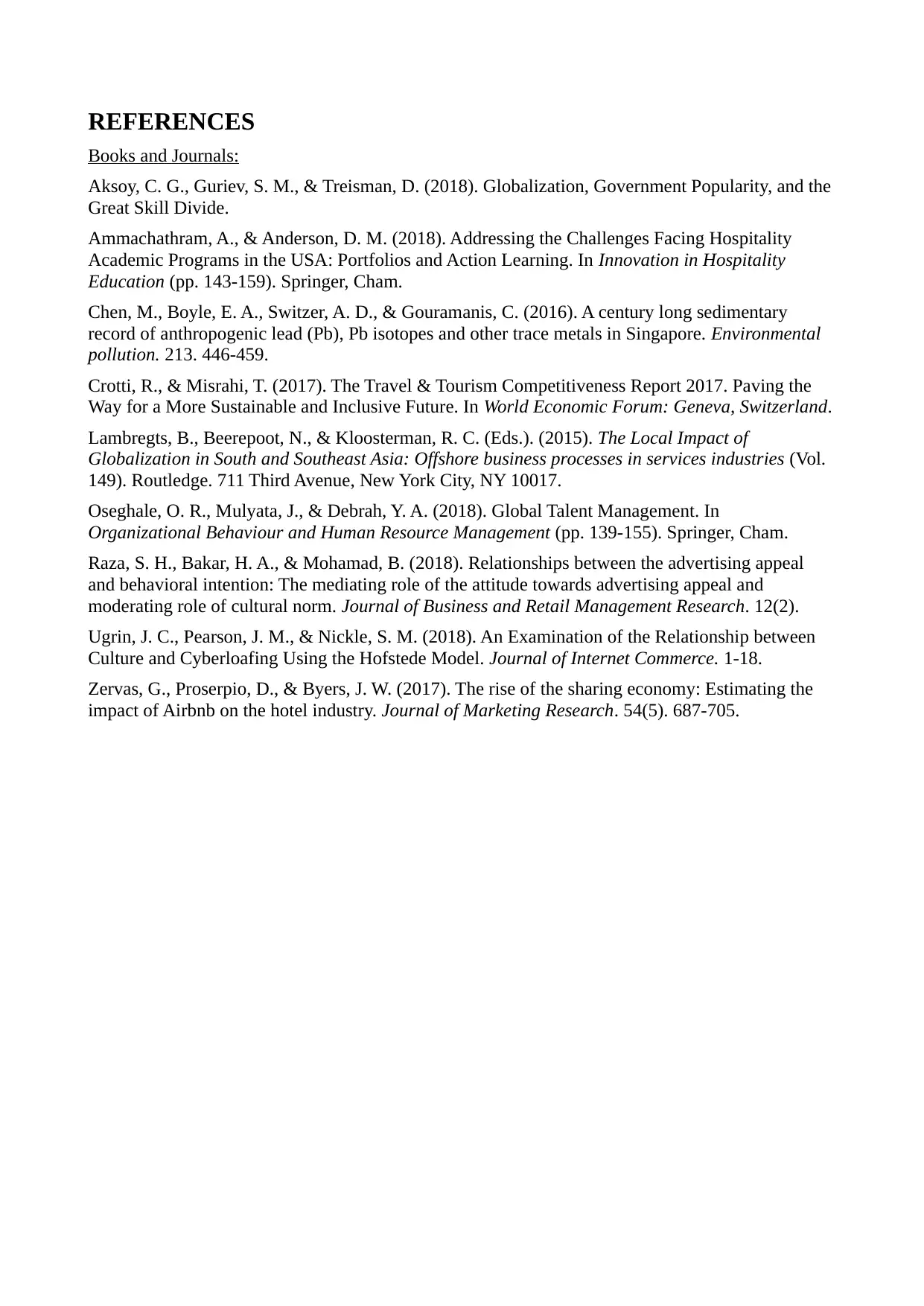
REFERENCES
Books and Journals:
Aksoy, C. G., Guriev, S. M., & Treisman, D. (2018). Globalization, Government Popularity, and the
Great Skill Divide.
Ammachathram, A., & Anderson, D. M. (2018). Addressing the Challenges Facing Hospitality
Academic Programs in the USA: Portfolios and Action Learning. In Innovation in Hospitality
Education (pp. 143-159). Springer, Cham.
Chen, M., Boyle, E. A., Switzer, A. D., & Gouramanis, C. (2016). A century long sedimentary
record of anthropogenic lead (Pb), Pb isotopes and other trace metals in Singapore. Environmental
pollution. 213. 446-459.
Crotti, R., & Misrahi, T. (2017). The Travel & Tourism Competitiveness Report 2017. Paving the
Way for a More Sustainable and Inclusive Future. In World Economic Forum: Geneva, Switzerland.
Lambregts, B., Beerepoot, N., & Kloosterman, R. C. (Eds.). (2015). The Local Impact of
Globalization in South and Southeast Asia: Offshore business processes in services industries (Vol.
149). Routledge. 711 Third Avenue, New York City, NY 10017.
Oseghale, O. R., Mulyata, J., & Debrah, Y. A. (2018). Global Talent Management. In
Organizational Behaviour and Human Resource Management (pp. 139-155). Springer, Cham.
Raza, S. H., Bakar, H. A., & Mohamad, B. (2018). Relationships between the advertising appeal
and behavioral intention: The mediating role of the attitude towards advertising appeal and
moderating role of cultural norm. Journal of Business and Retail Management Research. 12(2).
Ugrin, J. C., Pearson, J. M., & Nickle, S. M. (2018). An Examination of the Relationship between
Culture and Cyberloafing Using the Hofstede Model. Journal of Internet Commerce. 1-18.
Zervas, G., Proserpio, D., & Byers, J. W. (2017). The rise of the sharing economy: Estimating the
impact of Airbnb on the hotel industry. Journal of Marketing Research. 54(5). 687-705.
Books and Journals:
Aksoy, C. G., Guriev, S. M., & Treisman, D. (2018). Globalization, Government Popularity, and the
Great Skill Divide.
Ammachathram, A., & Anderson, D. M. (2018). Addressing the Challenges Facing Hospitality
Academic Programs in the USA: Portfolios and Action Learning. In Innovation in Hospitality
Education (pp. 143-159). Springer, Cham.
Chen, M., Boyle, E. A., Switzer, A. D., & Gouramanis, C. (2016). A century long sedimentary
record of anthropogenic lead (Pb), Pb isotopes and other trace metals in Singapore. Environmental
pollution. 213. 446-459.
Crotti, R., & Misrahi, T. (2017). The Travel & Tourism Competitiveness Report 2017. Paving the
Way for a More Sustainable and Inclusive Future. In World Economic Forum: Geneva, Switzerland.
Lambregts, B., Beerepoot, N., & Kloosterman, R. C. (Eds.). (2015). The Local Impact of
Globalization in South and Southeast Asia: Offshore business processes in services industries (Vol.
149). Routledge. 711 Third Avenue, New York City, NY 10017.
Oseghale, O. R., Mulyata, J., & Debrah, Y. A. (2018). Global Talent Management. In
Organizational Behaviour and Human Resource Management (pp. 139-155). Springer, Cham.
Raza, S. H., Bakar, H. A., & Mohamad, B. (2018). Relationships between the advertising appeal
and behavioral intention: The mediating role of the attitude towards advertising appeal and
moderating role of cultural norm. Journal of Business and Retail Management Research. 12(2).
Ugrin, J. C., Pearson, J. M., & Nickle, S. M. (2018). An Examination of the Relationship between
Culture and Cyberloafing Using the Hofstede Model. Journal of Internet Commerce. 1-18.
Zervas, G., Proserpio, D., & Byers, J. W. (2017). The rise of the sharing economy: Estimating the
impact of Airbnb on the hotel industry. Journal of Marketing Research. 54(5). 687-705.
⊘ This is a preview!⊘
Do you want full access?
Subscribe today to unlock all pages.

Trusted by 1+ million students worldwide
1 out of 9
Related Documents
Your All-in-One AI-Powered Toolkit for Academic Success.
+13062052269
info@desklib.com
Available 24*7 on WhatsApp / Email
![[object Object]](/_next/static/media/star-bottom.7253800d.svg)
Unlock your academic potential
Copyright © 2020–2026 A2Z Services. All Rights Reserved. Developed and managed by ZUCOL.





